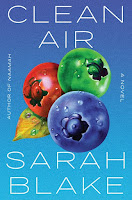Author: Sarah Blake
Publication Information: Algonquin Books. 2022. 320 pages.
ISBN: 1643751069 / 978-1643751061
Book Source: I received this book through NetGalley and a publisher's blog tour free of cost in exchange for an honest review.
Opening Sentence: "Dear Cami, We couldn't breathe the air."
Favorite Quote: "The Turning was ten years ago. That's how people talked about it. Though it took more than that year for the world to experience the full effect of it, and less than a month for any city or town to all but die off. But it was easier to call it, vaguely, the Turning. TO not recall which month took which town. To let it slip out of time. To let it become the generic past tragedy of the world."
***** BLOG TOUR *****
Review
The time is in future but not too far in the future - the 2030s or perhaps the 2040s. The world is in a post-apocalyptic new age in which humanity has learned to fight and survive the climate crisis. However, it is not an apocalypse of rising temperatures, rising seas, and the disappearing ozone layer. Rather, it is crisis of trees. Yes, trees. The trees have taken over, generating so much pollen so as to render the air unbreathable. That event is known as the Turning.
The world has adapted and restarted life, moving from airtight dome to airtight dome - life existing in literally these bubbles.
Kaito and Izabel remember the Turning. In fact, that was when they met. They survived when so many did not. They even thrived, falling in love and marrying. They are now parents to young Cami, whose entire life has been after the Turning.
Life in the bubble is safe and moving along a planned trajectory. However, the bubble cracks - literally and figuratively. A serial killer is breaking into domes at night, causing people to be exposed to the pollen and to die.
Somehow four year old Cami is involved for she talks about the killings in her sleep. Izabel begins a quest to protect her daughter and figure out the serial killer and the connection to her daughter. The ending, when it comes, is abrupt goes in a direction I don't expect. The environmental aspect I get as a current topic even though the trees being the cause of the apocalypse is somewhat out there. The imaginary world the book builds conjures the dystopian image. The serial murders introduce the mystery. Yet, the book ends up at magical realism and the supernatural
I don't really get it. The different genres mix together in the book but, for me, do not coalesce into a whole. For me, part of the reason may be that the characters do not become real. Cami is cute but way too precocious for a four year old. Kaito and Izabel seem distant throughout the book. I don't find myself rooting for them or against them. To some extent, I become distant and do not invest in the outcome.
I find the concepts - of the post apocalyptic world, of a serial killer, of a supernatural connection, of a family drama even - intellectually intriguing. The fact that the main character is a mother protecting her child should elicit the emotional reaction. Unfortunately, the characters and story for me fail to elicit that connection that makes me invest in the book. I walk away unsatisfied and not the reader for this one.
About the Author
Sarah Blake’s novel Naamah won the National Jewish Book Award for Debut Fiction. Blake is also the author of the poetry collections Mr. West and Let’s Not Live on Earth. In 2013, she was awarded a literature fellowship from the National Endowment for the Arts. She currently lives in the UK.About the Book
The climate apocalypse has come and gone, and in the end it wasn't the temperature climbing or the waters rising. It was the trees. They created enough pollen to render the air unbreathable, and the world became overgrown.In the decades since the event known as the Turning, humanity has rebuilt, and Izabel has grown used to the airtight domes that now contain her life. She raises her young daughter, Cami, and attempts to make peace with her mother's death. She tries hard to be satisfied with this safe, prosperous new world, but instead she just feels stuck.
And then the tranquility of her town is shattered. Someone—a serial killer—starts slashing through the domes at night, exposing people to the deadly pollen. At the same time, Cami begins sleep-talking, having whole conversations about the murders that she doesn't remember after she wakes. Izabel becomes fixated on the killer, on both tracking him down and understanding him. What could compel someone to take so many lives after years dedicated to sheer survival, with society finally flourishing again?
Please share your thoughts and leave a comment. I would love to "talk" to you.

No comments:
Post a Comment